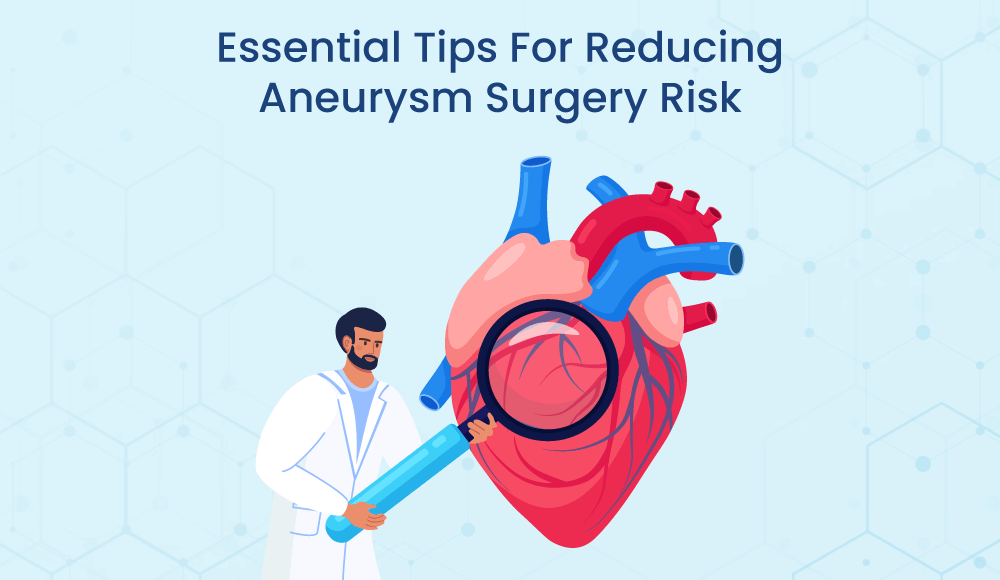An aneurysm is a condition that can be serious and requires prompt medical attention. It can develop in different areas of the body, with the brain arteries and aorta being the most commonly affected sites. It is characterized by a weak spot in the artery wall that bulges and can rupture, leading to severe internal bleeding. Recognizing the symptoms and taking steps to reduce the risk of an aneurysm is crucial for maintaining your health and well-being.
When it comes to aneurysm treatment, seeking the expertise of an aortic aneurysm surgeon is essential. These skilled medical professionals specialize in diagnosing and treating aortic aneurysms, which occur in the largest artery of the body, the aorta. By working closely with an experienced surgeon, patients can significantly reduce the aneurysm surgery risk.
In this blog post, we will explore 10 essential tips that can help you reduce the risk of aneurysm surgery. By implementing these suggestions into your daily routine, you can take proactive steps towards safeguarding your health and reducing the likelihood of an aneurysm requiring surgical intervention.
Book an Appointment for advice on Reducing Aneurysm Surgery Risk
Tips To Help You Reduce The Risk Of Aneurysm
High blood pressure is the major culprit that increases the aortic aneurysm surgery risks. Therefore, the tips below will suggest ways and habits to keep your blood pressure under control and you will also teach you about lifestyle changes on how to prevent aneurysm.
1. Get On A Healthy Diet
If your dietary preferences lean towards calorie-dense foods, excessive sodium intake, and high levels of saturated and trans fats, there is an increased likelihood of developing cholesterol and blood pressure issues. Additionally, this dietary pattern can contribute to obesity, which is a well-known risk factor for aneurysms. Consequently, it is advisable to consider the following recommendations:
- Go for fresh foods over packaged options.
- Avoid eating fatty parts of meat.
- Go for fat-free or low-fat dairy.
- Eat whole grains.
- Limit sugar beverages.
- Use heart-healthy oil such as olive, palm, or coconut oil.
2. Make Exercise A Part Of Your Routine
Regular exercise is the key! When you are working out, even for a small period every day, it will lower your blood pressure condition. Thus, you will develop good cholesterol in your body.
Moreover, if you pair exercise with a good diet, you will also lose weight faster, which is again good for regulating your blood pressure. You can also include aerobic and strength training sessions in your all-week exercise routine.
3. Embrace a Smoke-Free and Drug-Free Lifestyle
If you engage in smoking or drug consumption, making the decision to quit can significantly lower the risk of developing both aortic and brain aneurysms. There are various supportive measures available, such as nicotine gums, patches, and other cessation aids, to assist you in overcoming smoking addiction.
If you are dealing with drug addiction, reaching out to a reputable rehabilitation center can offer essential support and guidance as you embark on your journey towards recovery. If you are exposed to secondhand smoke as a passive smoker, kindly request that your friends and family members refrain from smoking in your presence. Moreover, if you can help them quit their own smoking habits, it would be even more beneficial for everyone involved.
4. Monitor Blood Pressure Level
You need to keep your blood pressure levels in check at all times! There are various at-home blood pressure monitoring equipment available at stores. When you know the numbers, you can take charge of your health, managing your lifestyle accordingly to lower or manage it.
By proactively monitoring your health for sudden spikes or irregularities, you can promptly reach out to your doctor to explore strategies for regulation and control.
5. Take Steps To Reduce Stress
Chronic stress can contribute to various health problems, including an increased risk of aneurysms. To mitigate this risk, prioritize stress reduction in your daily life. Here are some effective strategies:
- Try relaxation techniques like deep breathing, meditation, or yoga for a calm and balanced state of mind.
- Engage in regular physical exercise to release tension and promote overall well-being.
- Nurture your well-being by embracing self-care rituals that ignite joy and foster a sense of deep relaxation.
- Set healthy boundaries and confidently say no when needed.
- Find solace and support from friends, family, and community.
- Maintain a balanced lifestyle with adequate rest and sleep.
By actively managing stress, you can significantly reduce the likelihood of developing aneurysms and promote your overall health and well-being.
6. Get Sufficient Sleep
If you want your blood pressure to be in control, you need to get sufficient sleep at night. Adequate sleep is essential for maintaining healthy blood pressure levels. If you struggle with sleep-related issues or frequently wake up during the night, it’s important to consult a healthcare professional. Restoring a regular sleep routine can help you keep your blood pressure in check.
In cases of sleep apnea, where breathing interruptions occur during sleep, your doctor may recommend weight loss, adopting healthy habits, and potentially prescribing medications to manage the condition. Prioritizing quality sleep can contribute to reducing the risk of aneurysms and promoting overall cardiovascular health.
7. Balance Cholesterol Levels
Eating high-cholesterol food items is a strict no-no! It is a waxy substance that your body demands to build the cells, but too much of it is also bad. Too much cholesterol in your body might harden the arteries and cause arteriosclerosis, a common cause of aortic aneurysms.
You must modify your diet to lower the bad cholesterol and then promote the consumption of good cholesterol, omega-2 fatty acids, and others.
8. Get A Screening Test If Your Family Has A History
If your family has any history of aneurysms, it is better to talk to your cardiologist to help you with some screening tests. They will help determine if you have any such symptoms that might indicate the cause of an aneurysm.
9. Get Treatment
Seeking appropriate medical treatment is crucial for reducing the risk of aneurysm surgery. Here are key steps to consider:
- Regular check-ups: Schedule routine appointments with your cardiovascular surgeon to monitor your overall health and detect any potential signs of aneurysms.
- Follow medical advice: If an aneurysm is diagnosed, adhere to the treatment plan recommended by your healthcare team, including medication, lifestyle changes, or surgical interventions.
- Manage underlying conditions: Effectively manage conditions such as high blood pressure, high cholesterol, and diabetes, as these can increase the risk of aneurysms.
- Communicate openly: Discuss any concerns or symptoms with your doctor promptly to ensure timely intervention and appropriate management.
While unfortunately, there is no aneurysm cure, early detection and appropriate treatment significantly reduce the chances of complications and the need for aneurysm surgery. Even after undergoing surgery, it is crucial to maintain diligent postoperative care and follow the recommended aftercare instructions.
10. Avoid Alcohol
Limiting alcohol is the last yet most important tip for both men and women. Medical experts recommend men limit their alcohol consumption to one or two drinks daily, whereas, for women, it is only one drink daily! It will control the blood pressure and help you with aneurysm prevention.
Conclusion
These are the 10 tips that will help you keep your blood pressure and other health adversities under control. If you are experiencing any worrying symptoms with consistent pain around your chest or abdominal region, get yourself diagnosed immediately.
Aortic aneurysms are asymptomatic and cause symptoms only once the disease is advanced. Hence it is important to do health check-ups to make sure the aneurysm is not progressing. So, if you are searching for the best cardiologists, Dr. Khullar is one of the best names you can count on! Contact and book your appointment today!
Book an Appointment for advice on Reducing Aneurysm Surgery Risk





[…] If you want to keep yourself free from the aneurysm surgery risk, our blog shares some practical tips to help you reduce the risks. […]